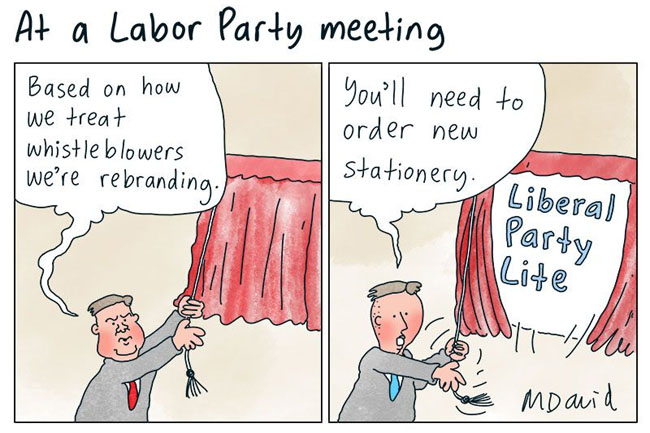As Australia's political system sees a shift away from the two-party system, the Labor Government needs to adapt to a new generation of voters, writes Professor John Quiggin.
IT’S BEEN A WEEK of seemingly unforced errors from Prime Minister Anthony Albanese and his government. It started with another invocation of his increasingly threadbare origin story, talking about eating broken Wagon Wheels outside the old factory.
This was followed by the announcement that an AFL stadium in Hobart took precedence over housing and his attendance at the wedding of a shock jock Kyle Sandilands, where he shared the festivities with some major criminals.
It ended with Albanese giving a bizarre interview to British Right-winger Piers Morgan, in which he stumbled through some anti-trans dog whistles.
The seemingly strange actions of the past week make sense on the assumption that Albanese sees the typical member of the Labor party “base” as someone much like himself. We can see this by looking at his personal background (much, though not all, of which I share).
Albanese is a middle-aged White male, raised as a supporter of the Catholic Church, the Labor Party and the South Sydney Rabbitohs, all of which he views in terms of cultural affiliation rather than belief or ideology. As he regularly reminds us, he comes from a poor working-class background.
However, he has long been a member of the prosperous professional class, with the usual trappings including a couple of rental properties. After working briefly for a bank, he went to university and then into a full-time political career. Despite never having held a manual job, he retains a strong nostalgia for the industrial economy that was at its peak in the 1960s, the first decade of his life.
His model of the political system is one of tribal conflict, embodied in Albanese’s love of “fighting Tories”. In this context, the term “Tory” (imported from Britain into the argot of the Labor Party) does not have any particular ideological content. It refers to a cultural/tribal conflict much like that between South Sydney and their traditional rivals, the Eastern Suburbs (now Sydney Roosters).
This conflict once mapped onto a division between the working class and the upper-middle class. Now, at least as measured by house values, it is one between millionaires (Marrickville median house price: $1.8 million) and multi-millionaires (Vaucluse median house price: $8 million)
The gradual decline of first-preference support for the major parties, particularly the rise of the Greens, poses a problem for this viewpoint. Even if a second preference vote flows through to Labor, it does not represent the kind of affirmation that the tribal model of politics values. This, as much as deliberate deception, explains Labor’s willingness to post election material with the spurious claim that voting 1 for Labor is the only way to get rid of Morrison.
It’s even worse when the Greens start winning seats in historically working-class areas by offering more Left-wing policies. From the two-party viewpoint, the voters in these areas belong to Labor and should never deviate from their loyalty over something as trivial as policy.
For someone in Albanese’s position, voting Labor is a matter of identity rather than economic interest. As long as the Labor Party evokes the image of a party for male manual workers, that identity will persist. But it’s important not to get in the way of aspiration, for example, by coming down hard on negative gearing or being too generous to the unemployed — especially the young unemployed.
This is not necessarily a bad political strategy for Labor, at least in the short run. The Liberal Party is consumed by its own divisions, unwilling to shift ground on any of the culture war issues dear to its elderly and bigoted base. On climate change, equal marriage and Indigenous issues, the Liberals are now far out of the mainstream. That leaves Albanese plenty of room to move to the Right on issues – like trans rights, where opinion is relatively evenly divided – and pick up the votes of less extreme social conservatives.
The problem with this strategy is that it is based on a misunderstanding of Labor’s support base. The typical Labor voter is not an aspirational middle-aged male manual worker, but a younger worker in the service or information sectors, more likely to be female and university educated. The archetypal Labor voter, if a concrete example is needed, would be a Gen Z enrolled nurse working in a major city hospital.
In the long run, Albanese is ignoring the real threat to Labor. Among voters under 40, the Greens have as much support as the L-NP and they are gaining ground steadily. Labor’s shift to the Right will accelerate this trend. And, as loyalty to party labels erodes, more and more centre-Left and Left-wing voters will realise that their policy views are closer to those of the Greens than to Labor.
If Independents keep picking up former L-NP seats and Labor loses seats to the Greens, majority Labor governments may become a thing of the past. That would not be a bad thing, but it is certainly not the outcome Albanese is looking for.
John Quiggin is Professor of Economics at the University of Queensland. His latest book, 'Economics in Two Lessons: Why Markets Work So Well and Why They Can Fail So Badly', is out now from Princeton University Press. You can follow John on Twitter @JohnQuiggin.
Related Articles
- Honeymoon is over for Albanese's Labor
- Be progressive, Albo, don’t implement Stage 3 tax cuts
- Three reasons to feel cheerful — about being an Australian since May
- Full employment: The promise Albanese must keep
- Repealing tax cuts: Albanese needs to forget Murdoch, act now and be bold
 This work is licensed under a Creative Commons Attribution-NonCommercial-NoDerivs 3.0 Australia License
This work is licensed under a Creative Commons Attribution-NonCommercial-NoDerivs 3.0 Australia License
Support independent journalism Subscribe to IA.














